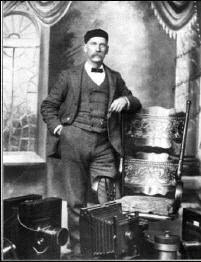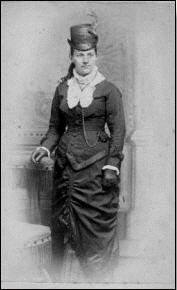Jewell or Jewel Family Genealogy - Family Sketches
William Hank Jewel
 My grandfather, William Hank Jewel, was a professional photographer in Christiansburg for nearly half a century. He also traveled over three counties, Montgomery, Floyd, and Pulaski, taking pictures.
My grandfather, William Hank Jewel, was a professional photographer in Christiansburg for nearly half a century. He also traveled over three counties, Montgomery, Floyd, and Pulaski, taking pictures.
Those were the days when photographs were made on a wet plate and had to be developed immediately. He carried his tent and his equipment in a wagon. His pictures can be found throughout the region today. According to Louise B. Allison's Early History of Snowville, he at one time had a photographic shop in that town, about two years after the Civil War. I never heard that from family members. He would have been only about 19 years of age.
He was born in Floyd County VA 10 Aug. 1848, the only son of William Jewel, a farmer and part-time Methodist minister and school teacher. His mother was Mary Hall Jewel, daughter of Asa Hall, a Revolutionary War soldier who settled in Montgomery County about 1795. His paternal grandfather was Thomas Jewel, orphaned in Loudoun County around 1779 and an early resident of Montgomery County.
His first wife was Sarah Jane Davis of McMinn County, TN. They had five children before her untimely death 28 Feb. 1886. He was remarried to Cora Winston 25 Jan. 1893, and they had three children.
before her untimely death 28 Feb. 1886. He was remarried to Cora Winston 25 Jan. 1893, and they had three children.
I have only one fleeting memory of my grandfather, when I was around four years old. So the following impressions and anecdotes are formed from hearsay from family members. My mental picture of my grandfather, formed from these exchanges, is of a good, stern man, physically muscular, mentally active, and reasonably enlightened for his time and circumstances; of a beloved baby brother to eight older sisters; of a man who, though he might have been spoiled as a youth with so many doting sisters and elderly parents, was buffeted and tempered by hardship and tragedy.
He was almost lost to this world as a baby; but not quite, else I and his many other descendants would never have been. He had apparently crawled to the spring house and fallen in. An older sister just happened by and saw the baby lying in the water and rescued him. On another occasion when the family was living on Little River in Floyd County, he took off his clothes and toddled down to the river. When the frantic searchers found him, he was sitting on a felled tree jutting out over the river.
I've heard many stories about his physical prowess. When it snowed at night he would get up next morning and run around the house barefooted. He said it kept his feet warm all day. When he was 18 years old, on a bet or a dare, he picked up a stove that weighed 500 pounds and carried it across the room. My Uncle Leslie used to say his father could jump in the air and click his heels together three times before landing. Try it!
My mother often remarked about how personally clean he was. He was also very frugal — apparently had to be. When Louin, his eldest son, became a successful civil engineer in Pittsburgh and belonged to an expensive club, Hank thought it an extravagant expenditure.
He loved learning, especially words, consulting the dictionary frequently. William had tried to give his only son a good education, and although it was good for that time in the South, it would no doubt have been better if William had not suffered such financial losses just at that time. Hank was one of 12 students enrolled at Roanoke College, in Salem, in 1867, just two years after the end of the Civil War when the South was devastated. He was there for most of a year. Later he attended the spring and fall 1871 sessions of East Tennessee Wesleyan University, a four-year degree school in Athens, TN. While there in college he met Sarah Jane Davis, and they were married there 2 Oct. 1872.
Hank brought his bride back to Christiansburg, and then sometime later he took her to Texas where their first child, Viva, was born. He may have learned photography in Texas, or he may have learned it before or during the years between his two college experiences. Like his father, he apparently became disillusioned with new lands and moved back to Christiansburg. There his second child, Louin, was born in 1877. Hank must have begun his life-long profession of photography about this time.
He was a deeply religious man, and there was apparently a heavy religious atmosphere in the household. It was too much for my mother, and she rebelled against it. I’ve heard her say she “was exposed to Methodism but it didn’t take.” Hank was stern with his children, particularly those by his first marriage. He believed in the old adage that to spare the rod was to spoil the child. He did have a quick temper — “that awful Hall temper” my mother would say. Once, she related, he gave her a whipping, and when she asked him what that was for, he replied “on general principles.” When Louin ran away from home, his father was terribly distressed; but then when Louin returned, he gave him a thrashing.
My mother felt her father was the one who suffered most from his temper and his stern ways. “My poor father,” I’ve heard her say many times. My one memory of my grandfather is of his quick temper. I must have been about four. He was seated at his retouching stand, magnifying glass in hand, working on a negative. I must have been watching him too closely and caused him to mess up his work, because he struck me on the hand with the magnifying glass.
Yet it was apparent to me that his children all loved and admired him. “Papa used to say”... is something I've heard them say many times. They had respect for his integrity, the quality of his mind, and his unflinching principles. The children of his second marriage called him “daddy,” and they always spoke of him with the greatest affection.
The great tragedy of his life was the loss of his first wife, Sarah Jane, whom he dearly loved. She was just 37 years old, leaving him with five young children to care for while trying to make a living. When I was a grown man and complained to my mother about some bad luck or other that I had, she said: “My father said when he heard people talking like that, he thought what they needed was to have some real trouble.” The doted-upon baby brother had learned the hard way of life’s often cruel and uncertain paths.
He had to support his family on a photographer's income in a little rural Southwest Virginia county seat in the prostrate South of the post-Civil War period. Moreover, he was not a good businessman. He hated to try to collect money people owed him, yet he despised them for not being honest enough to pay their just bills.
Fortunately there were older, childless sisters to whom the children could be farmed out after Sarah’s death. One sister, Emeline, a spinster, remained a member of Hank’s household. She became a second mother to Iva for the next five years. Then Emeline also died. After the death of her beloved “Aunt Emma,” Iva appears to have spent some time with Christina, “Aunt Tee.” How the other children were cared for is not known exactly. Some of them appear to have spent a lot of time with Aunt Lucy, and Viva for a period was sent to boarding school.
Hank was remarried 25 Jan. 1893, seven years after Sarah Jane’s death, to Cora Lee Winston. He was 44 years old. Cora was the daughter of Joseph Heckman Winston and Rhoda Barbara Cecil Early. Cora was one of eight children, three of whom died in childhood. Hank and Cora lived together for 26 years, until Hank’s death in September 1919. Their three children were: Mary Winston, Joseph William, and Ruth Michelow. The children of the first family lived with them.
Hank had his prejudices. One was against insurance. A fire broke out in downtown Christiansburg where his house and studio were located. Several houses burned, including his. He had no insurance. He bought a very small house on west Main street and later added a two-story front of four rooms. This is the house I remember visiting as a child and which, many years later, I auctioned off as administrator of my Aunt Winnie’s (Mary Winston Shields) estate.
In his old age Hank had to endure another personal tragedy, the death of his oldest son, Louin, at age 37. Louin, whose wife preceded him in death, left a $10,000 insurance policy with his father as beneficiary.
My mother thought her father had a mild heart attack when he was in his fifties, and thereafter suffered with some degree of heart trouble. He died in his sleep at his Christiansburg home 10 Sep 1919 at age 71. His grave, beside those of his two wives, is in Sunset Cemetery, Christiansburg.
Cora lived on with her children at the home in Christiansburg until some years later when her daughter, Mary Winston, moved to Baltimore to teach school and brought her mother with her. Cora died 18 June 1931. She was 74 years old.
In July 1913, W. H. Jewel contributed an article to the Pittsburgh Bulletin called A Boy's Impression of the War. His daughter was working for the paper at that time.

